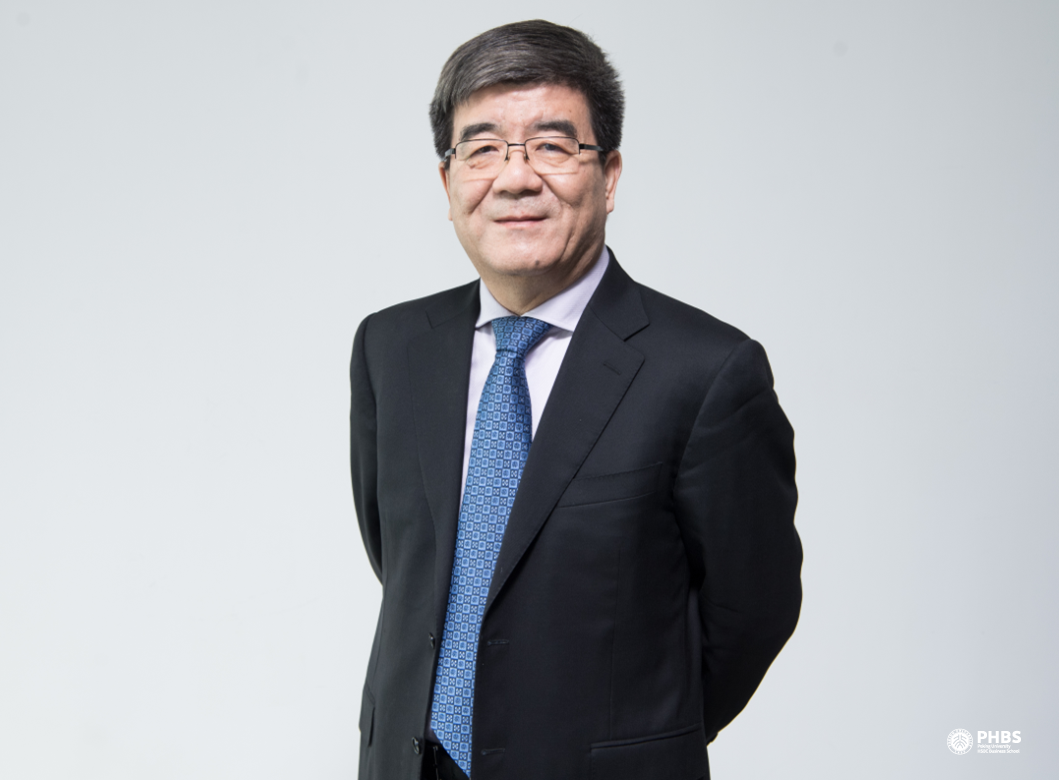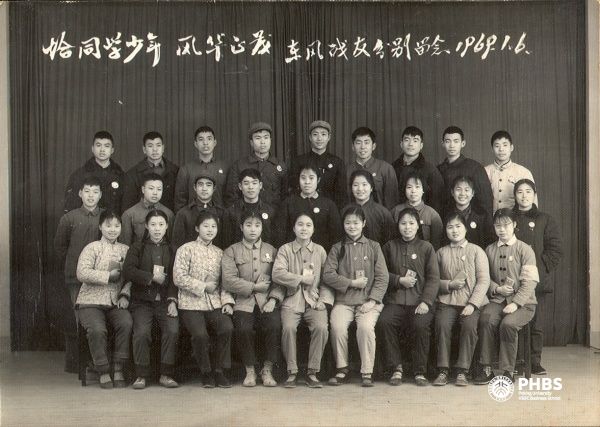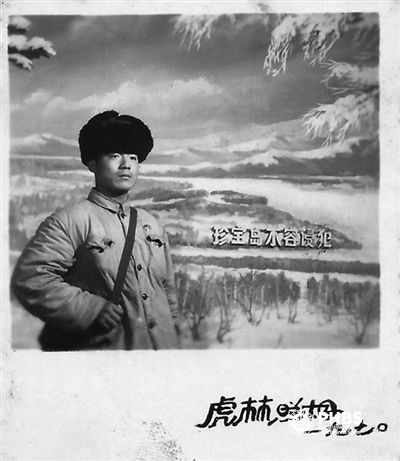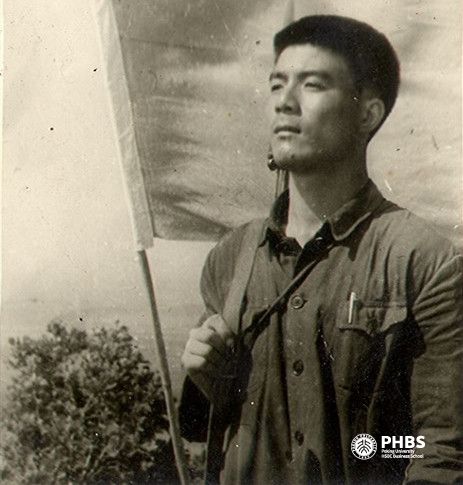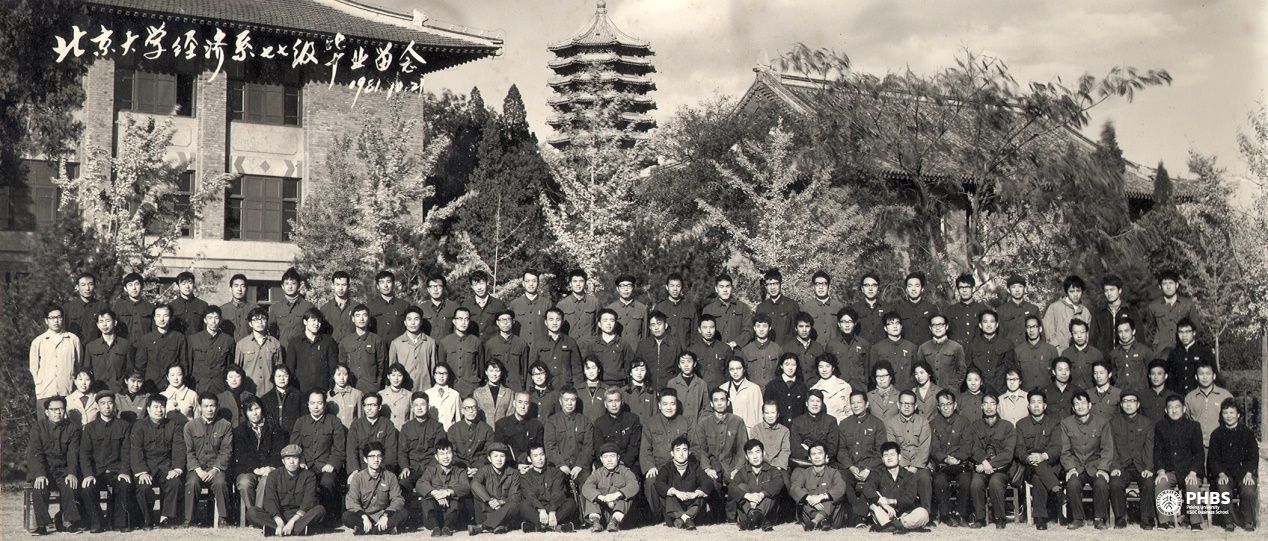Born in Hangzhou in August 1952, Hai Wen graduated from the School of Economics at Peking University with a bachelor's degree in 1982 and California State University, Long Beach with a master’s degree in Economics in 1983. In 1991 he obtained his second master’s degree and a Ph.D. degree both in Economics from University of California Davis. Now he’s the dean of Peking University HSBC Business School. He’s also one of the co-founders of PKU China Center of Economic Research, professor of National School of Development at Peking University. He previously served as the vice president of Peking University and the dean of the Peking University Shenzhen Graduate School previously. His courses and research interests mainly deal with international economics, economics of development and economics of transition.
“Let’s get started,” Hai Wen said to the interviewers in his office in HSBC Business School. Despite the hot weather, he heartily shared his life experiences and traced life-changing events back to the old days. “Since I went to Peking University, I have regarded it as my home, and it is my dream to teach on the PKU dais till 80.” Speaking of this, an aura of youth still lingers on this senior in his sixties.
Hai had to withdraw from school in the eighth grade according to the decree issued in the Cultural Revolution. After the withdrawal, he joined the “Up to the Mountains and Down to the Countryside Movement”, being one of nearly 20 million intellectual youth nationwide who were under Chairman Mao’s instruction in 1968 that “It’s necessary for the intellectual youth to receive re-education from the poor and lower-middle peasants in the countryside.”
Hai Wen’s graduation photo in 1969 (the third from right in the third row)
In 1969, the 17-year-old Hai Wen, among the first batch of intellectual youth, embarked himself in the construction of rural villages in Heilongjiang, the northern frontier facing the Soviet Union. Despite numerous failed attempts ascribed to his family background, he finally made it to join the Movement, for his determination to serve the country was so great that he even cut his finger and write the application letter in blood.
Hai Wen in Heilongjiang
Hai Wen endeavored to do his best in building and guarding the frontier and received several awards for his performance, such as the “Labor Model.” In the production team, he could always get more work-points than others and earned peasants’ respect and acknowledgment gradually. Hard as the country life was, those experiences of collective labor were rather rewarding and encouraging, as what he said, “Thanks to the toughness at that period, I can endure hardship when I have to.”
What really discouraged him were the twists and turns on the way of getting admitted to college. Born in a family of intellectuals, Hai Wen had always craved for receiving advanced education. Chances came when colleges turned open to recommended workers, peasants and soldiers. Yet the “disgrace” in his origin kept him from being admitted for four years. Despite the toil and trials in eight years, Hai never resigned himself to disheartenment nor gave up his dream of gaining knowledge; instead, he made abundant preparations and devoted to learning assiduously. Thanks to Party Branch Secretary Li Chunsheng, who counseled him to tackle the issue of his political identity first, Hai Wen became a member of the Communist Party in 1977, which served as a stepping stone to his college dream.
Hai Wen's best nine years of devoting to the Great Northern Wilderness
In 1977, when the Ministry of Education resumed the college entrance examination, Hai Wen seized this opportunity and was admitted to Peking University. In particular, he recollected that seeing the composition title in the Chinese examination, which is “Every time I sing the song ‘The East is Red’”, the reminiscence of laboring in the Northeast instantly came in sight. Undoubtedly, what the Great Northern Wilderness endowed to him has been treasures of life that Hai Wen would move on with.
Study life in Yanyuan Garden: carrying an enamel lunch box to the library
In August 1977, Hai Wen passed by the west gate of Peking University and admired the students inside. "I didn't go in at that time, just looking inside in a distance for a while." It is the very glance that became a critical point for his application for Peking University as the first choice.
Hai Wen was finally admitted to the Department of Economics of Peking University. When first entering the campus, Haiwen knew little of the study life and behaved in an awkwardly countrified way, for the memory of 10-year forest life in the Northeast Tiger Forest was not that easy to erase. "I didn't have any plans when I first entered the campus. I even wondered what students would do in the library when my classmates invited me to go and study. A library could be a place for self-study—that was a fresh idea for me. Like a sponge to absorb knowledge from others, he actively participated himself in study activities and listened to what his classmates and teachers shared and taught.
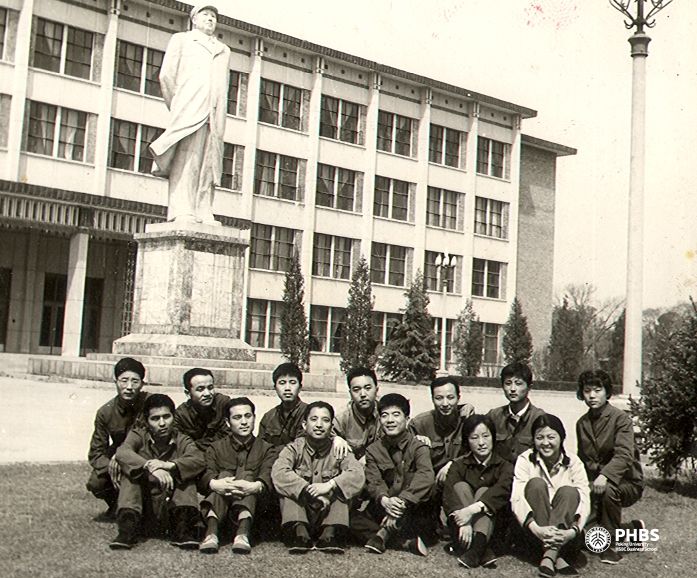
Hai Wen (third from right in the first row ) and 77 students from the Department of Economics
The academic atmosphere of Peking University left a vivid impression on him. "Almost everyone who experienced the countryside life would cherish the opportunity to go to school and acquire knowledge eagerly. I used to get up at 6 o'clock every day and go to the library when I didn’t have class. At noon, we would carry with us an enamel lunch box into the library, and studied after lunch till 10 o'clock in the evening. There was full of academic freedom and responsibility for society. The students often blushed while arguing for the divergence of views, and the teachers were very rigorous and serious about academic studies. "Professor Chen Daisun gave his classes in a clear and humorous way, and Professor Li Yining was novel and honest, who introduced western economic theories and made students feel refreshed. He was very candid when discussing with his classmates, sometimes directly saying that he had not considered this issue.”
Graduates from the Department of Economics in 1981
The life of going to the countryside in the past ten years made him mature and resilient. Although with little conception of economics in the beginning as a fresh student, Hai Wen gradually found his own methods of study. "I liked to draw pictures and chose a course of international trade, in which the teacher used graphs to analyze and explain economic theories. I found it very interesting. I also read Samuelson's Economics and dug into western economics. "Since then, the 28-year-old student chose western economics as his research area and embarked on the road of studying in the United States later, becoming the first student to study abroad at his own expense after the college entrance examination was resumed.
"Before going abroad, I was in a dither. An unfamiliar land was waiting for me, and I had no idea how many challenges I would face. At the time, my English was really bad. When I entered the US Customs, the terrible communication even forced me to find a translator. Hai Wen never surrendered himself to the difficulties of overseas study, since the nine-year life in the countryside gave him the courage and persistence to face any hardships. After receiving a master's degree in Economics from California State University in Long Beach, USA, he got his master's degree and a doctorate degree in Economics from the University of California, Davis, and eventually obtained tenure from the Ford Louis College of Business School.
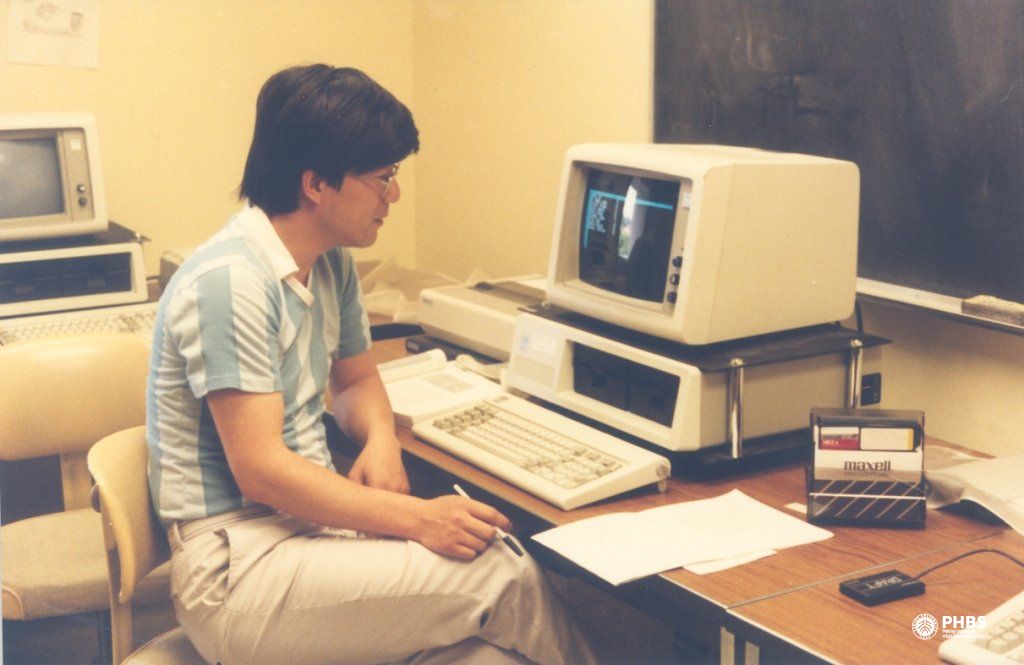
In the mid-1980s, Hai Wen used computer to learn during his Ph.D. study
For Hai Wen, the choice of studying abroad was to broaden his horizon and join in the Chinese Economic reform. After insistent endeavors, Peking University’s China Center for Economy Research (CCER) was founded in 1994. Justin Yifu Lin was the director, and Yi Gang and Hai Wen were deputy directors. At that time, the Center stood for a brand-new explorative attempt to renovate the teaching and research system, and was also a pioneering attempt to attract overseas students to return to China. It built an open, pluralistic, and international platform for the theoretical studies of Chinese economic reform. In 2004, the center was elected as “100 Key Bases for Humanities and Social Sciences of the Ministry of Education”. In 2008, it was renamed “Peking University National School of Development” and it became one of the most important think tanks in China.
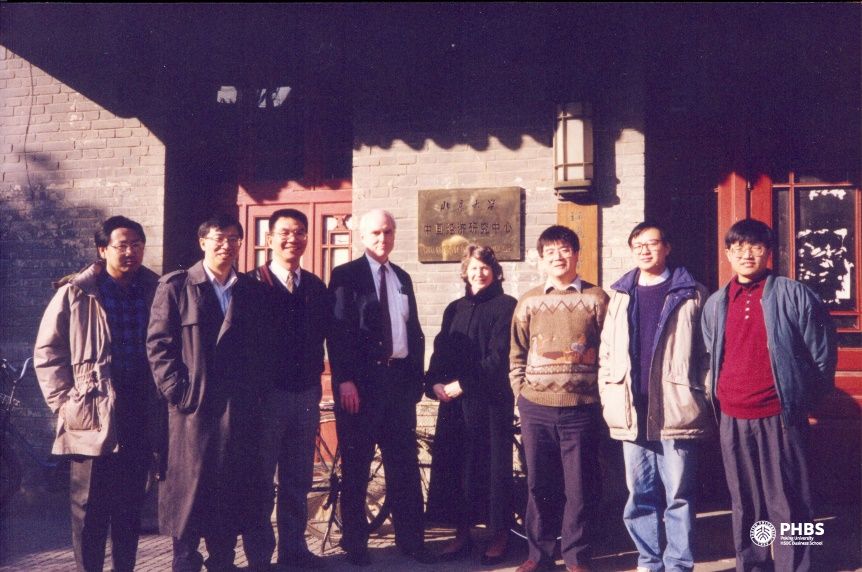
At CCER's old Geology Building (from left to right: Zhang Fan, Yi Gang, Justin Yifu Lin, Dwight Perkins, Mrs. Perkins, Hai Wen,Yu Mingde, Zhang Weiying)
Hai Wen could be seen as the epitome of sticking to the original pursuits even at the price of other lucrative opportunities. He could have had better career opportunities when returning to China, but he left them all aside, considering going back to Peking University and focused on academics and education adhered more to his volition. He believes that popularizing modern economic education in China and improving the research level of economics are crucial to Chinese practices of deepening reform and continual development. Standing at the turning point of a new era, Hai Wen took the initiatives to master his destiny by actively involving himself in decision-making at key turning points of our nation.
HSBC Business School: building a world-class business school
Hai Wen also voluntarily made the decision of going to Shenzhen. There was an anecdote about it. Around 2003, Lin Jianhua, who then served as the vice president of Peking University, visited Hai Wen and hoped that he could manage the Peking University Shenzhen Graduate School of Business. Later in 2011, in the congratulatory letter for the 10th anniversary of PKU Shenzhen Graduate School, Lin regarded this recruitment as one of his great contribution to the school.
However, at the first time Hai Wen heard the request, his initial reaction was, “Why am I going to Shenzhen?” But after Hai Wen first visited Shenzhen, he began to seriously think about this—"At the time, I compared Shenzhen with California. In the early years, it was considered that there was no culture and no education in California, but after its rapid economic development, California's higher education, especially public universities, become the best in the United States. Likewise, Shenzhen need a business school, and particularly need to develop higher education. It is promising to run a school here."
Another reason that persuaded him to go to Shenzhen was the empty school at that time and the insecure students who were assigned there with depression, including someone he had taught.
Hai Wen found the problems but also the opportunities. Consequently, he decided to head down south with a start-up fund of one million and then started his challenging entrepreneurial journey.
In 2004, when Hai Wen started the Peking University Shenzhen Graduate School of Business, he was all alone with neither students nor teachers. In order to get the school on track as soon as possible, Hai Wen decided to receive transferring students from other schools of Peking University. “Lacking teachers, I invited the professors of China Center for Economic Research, School of Economics and Guanghua School of Management,” Hai Wen said.
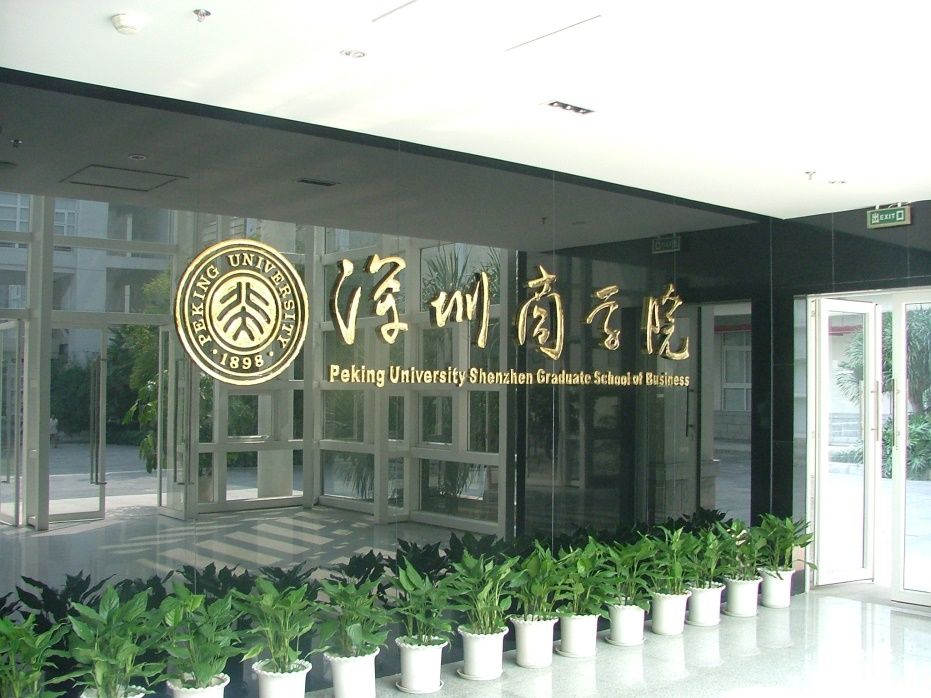
New teaching building in 2006
After a short preparation, the school opened in the fall of 2005, and 63 transferring students from other schools arrived in Shenzhen, whose abilities and qualities were questioned initially. However, Hai Wen believed deeply that the most valuable asset of these students is exactly those setbacks and failures they have experienced.
For Hai Wen, the graduates of the early years of the school are his proudest students. Wang Dengfeng, entered school in 2006, who is currently in charge of Alipay, was often cited by Hai Wen as a good example. “Although he didn’t do well in postgraduate entrance examination, he gave us a diligent and earnest impression on the admission interview. Thus we recruited him. And not surprisingly, after entering school, he actively ran for class monitor and then led his class to an advanced level.”
There are no students who cannot be taught well, only teachers who are not diligent enough. Hai Wen practiced this principle in his career. He actively communicated with students in BBS, intranet, Renren.com, and he often held class meetings in order to talk with students in person. He even recorded every class meeting on a black notebook and read it at any time. For his students, Hai Wen is not only deputy dean, professor, but also a friend who can be with them.
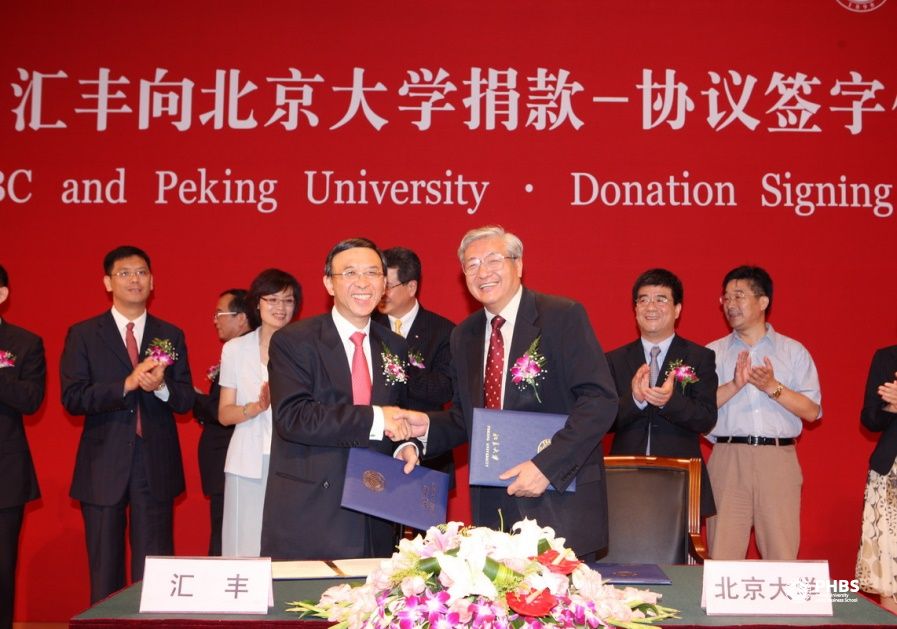
HSBC and Peking University Donation Signing Ceremony in 2008
In 2008, because of its strength and potential, Shenzhen Graduate school of Business gained a large donation form Hong Kong and Shanghai Banking Corporation (HSBC) of RMB 150 million and then renamed as Peking University HSBC Business School. This was the largest single donation for education in China at that time, and it was the first time HSBC allowed another institution to use its name.
With the help of HSBC, HSBC Business School has developed rapidly in terms of student resources, teachers and brand influence. In 2009, university graduates from Peking University and Tsinghua University enrolled by HSBC Business School accounted for 42% of the total, and the school no longer receive transferring students who failed the postgraduate admission exam of other university. In addition, many outstanding overseas professors with top-notch university degrees joined HSBC Business School, thus making the faculty become more international.
During the 13 years in Shenzhen, Hai Wen never forgot his initial mission. He has always fought in the front line of popularizing and upgrading modern economics education, and continued to innovate in this field.
In 2017, Peking University HSBC Business School UK Campus (PHBS UK Campus) was established. This is the first time that a Chinese university independently set up its branch in a developed country, with its own property rights, self-management, and self-granted degree system. It is also a great output of China's economic education research.
In the same year, Professor Thomas J. Sargent, the 2011 Nobel laureate in economics, announced that he would join the HSBC Business School to build the Sargent Institute of Quantitative Economics and Finance, which marks that the faculty of HSBC Business School has reached world-class level.
At the Netease Annual Economist Conference in 2018, Hai Wen was named as “Netease Most Influential Economist of the Year”. He posted his thoughts in his Wechat Moments as follows, "This award is truly unexpected. My main job is to teach, like candles, burning themselves to illuminate others. I will work hard in the future, and make more contributions to the education and research of Chinese economics towards the world stage."
Willingness and persistence: “I never regret my choice”
“I never regret my choice,” Hai said. “Others, when choosing jobs, think more about hardships and money, but I choose jobs based on my preference. For example, when I was in junior high school, I went to a factory working all day and mechanically repeated an action. I didn't like this kind of work. So, when everyone was rushing to the factory, I chose to go to the countryside. The life in countryside was bitter, but I was interested in growing crops.”
Many of Hai’s choices seem to be a pity from others’ perspective because he gave up a foreseeable and promising future. When he returned to China in 1995, he renounced a well-deserved deputy-bureau-level position to pursue his ambition of propelling education in economics. Then, he declined the presidency of Beijing Foreign Studies University in 2009 because of his persistence and commitment to Shenzhen.
In 2009, Hao Ping, then deputy minister of education, recommended that Hai should serve as president of Beijing Foreign Studies University. Hai contemplated for a week and finally declined. At that time, Hai was preoccupied with Peking University’s blueprint in Shenzhen. He wrote a letter and personally delivered it to Zhou Ji, then minister of education, to decline the opportunity.
Hai’s willingness and persistence have made Peking University’s blueprint in Shenzhen a great success. Since 2008, Peking University Shenzhen Graduate School has entered the fast track of development, forming a system of disciplines that highly integrated industries and markets. Among them, the School of Chemical Biology and Biotechnology is a research institution that focuses on chemical genomics research on major diseases; HSBC Business School is committed to the frontier academic research of economics, finance and management. In addition, Peking University Shenzhen Graduate School has hundreds of high-level faculty members with international backgrounds and enrolled nearly 10,000 full-time postgraduate students.
Hai’s choice has always been aligned with his own original aspiration—the spirit of Peking University. Whether he was studying in the United States or working at Peking University, he spent more than ten years in each of his positions. Hai’s another understanding of the spirit of Peking University lies in his bravery and innovative mindsets, exemplified by his enterprise in Shenzhen and the establishment of UK Campus. “The happiest thing is to teach at Peking University until the age of 80,” said Hai.
Written by: Zhan Xulong, Zhang Yujuan, Li Shuqin, Yang Fan, Yan Congcong
Edited by: Ma Yaoli, Wei Yunqi, Fu Wenyun, Huang Weijian
Source: PKU News (
Chinese)





